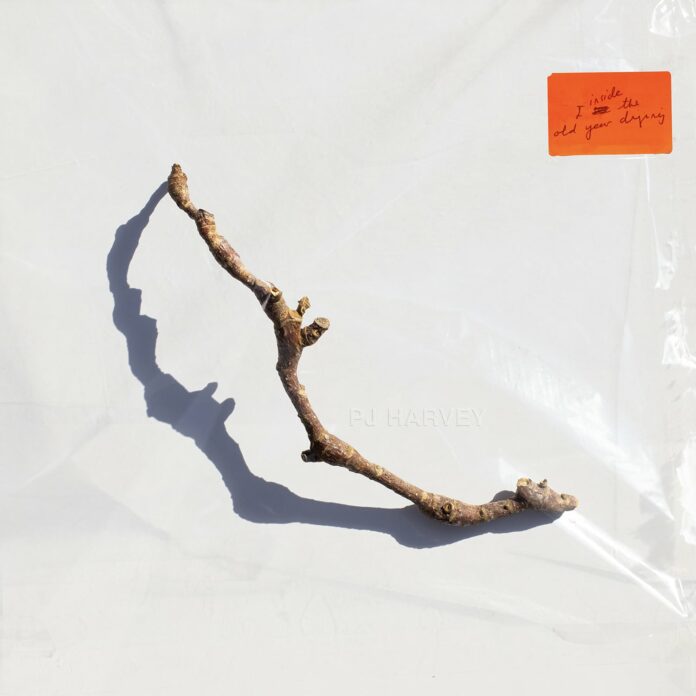I Inside the Old Year Dying was born from heartbreak, though perhaps not the kind that first springs to mind. The continuous cycle of releasing and touring albums had worn PJ Harvey down to the point of severing her relationship with the music itself, and though she continued to make music for theater and television, she was uncertain about how to move forward. That feeling of being lost, of intense searching coupled with exhaustion, permeates her 10th album and first since 2016’s The Hope Six Demolition Project, channeling it into a strangely immersive experience that can somehow be both disquieting and comforting, but never not beguiling. After so many years without a PJ Harvey album – and especially considering the journalistic, somewhat divisive approach of the last one – the shift to something seemingly amorphous, allusive, and inscrutable might alienate even more fans. It is playing with those same qualities, however, that has allowed her to not only venture beyond preconceived boundaries but deeply reconnect with her words and melodies, resulting in a record of wondrous and palpable immediacy.
Lyrically, I Inside the Old Year Dying draws directly from the poetry book that preceded it, 2022’s Orlam. Written in Dorset dialect, the collection chronicles a year in the life of a girl named Ira-Abel Rawles, inviting comparisons to Harvey’s own sheltered, rural upbringing. Strangely enough, though, setting these 12 pieces to music does the opposite of foregrounding any autobiographical parallels. Harvey has a way of obscuring not just any semblance of narrative but her own voice, and along with longtime collaborators John Parish and Flood, who co-produced the album, they drift into what she has described as a “sonic netherworld” that contains echoes of her past work but eschews repetition or convention. It is tempting, in light of the recent reissue campaign of Harvey’s albums, to see a song like ‘Seem an I’ as an attempt to capture the raw power of an early demo, but what’s transfixing about it is not its sparseness so much as a careful subtlety: a riff that sounds both earthy and ethereal, enveloped by instruments that either further ground Harvey’s vocals or edge out into the unknown – all blurring together and hardly identifiable without looking at the credits.
The effect, achieved throughout I Inside the Old Year Dying, is to muddy the line between the human and the divine (one of the recurring characters is a Christ-like figure called Wyman-Elvis), the nature-bound and dream-like, memory and imagination. “I ascend three steps to hell/ The school bus heaves up the hill,” Harvey sings on ‘Autumn Term’, which loops a field recording of what sounds like children playing until it blends into the background of the song, buzzing and alive in a sort of uncanny way. As the protagonist’s innocence fades, Harvey’s poetry occupies the increasingly slippery space between girlhood and adulthood, rendered all the more vivid by music that sounds at once improvisatory and atmospheric, rough yet diffuse. “Slip from my childhood skin/ I zing through the forest,” she sings on ‘I Inside the Old I Dying’, embodying a haunting transformation. Rebirth is not a new beginning, Harvey seems to suggest, but this in-between, laid out in the eerie shimmer of the opening track: “So look before and look behind/ At life and death all intertwined.”
As inward-looking and isolated as it seems, the album often feels like a dance with history more than Harvey’s own past, enigmatic and oddly tender. There are allusions to Elvis, Shakespeare, John Keats, and Samuel Taylor Coleridge, in some cases not so much invoking as conversing with them: “My love, will you come back again?” she sings, at the end of ‘Lwonesome Tonight’, in response to the song that itself references As You Like It. Off the page, you sometimes wish the yearning simmering at the core of the album was made a bit more tangible, rose a little further to the surface, or gave way to something bigger. Maybe that’s not the path it’s meant to follow, though. The climax of intensity is appropriately reached on the closer, ‘A Noiseless Noise’, but it’s barely sustained, a reminder of the transitory nature, the smallness of the whole affair. “Go home now love, leave your wandering,” Harvey implores. From there, you get the feeling it can only grow.

